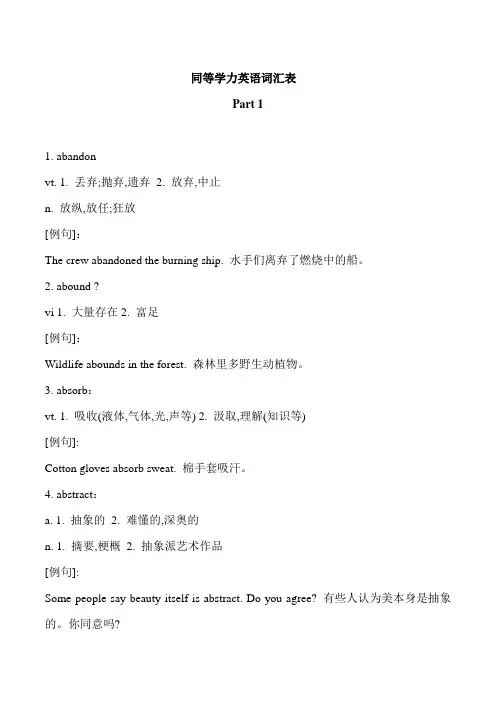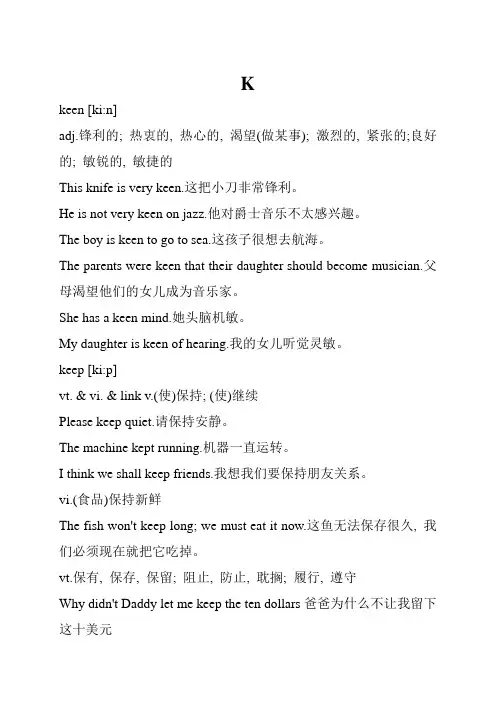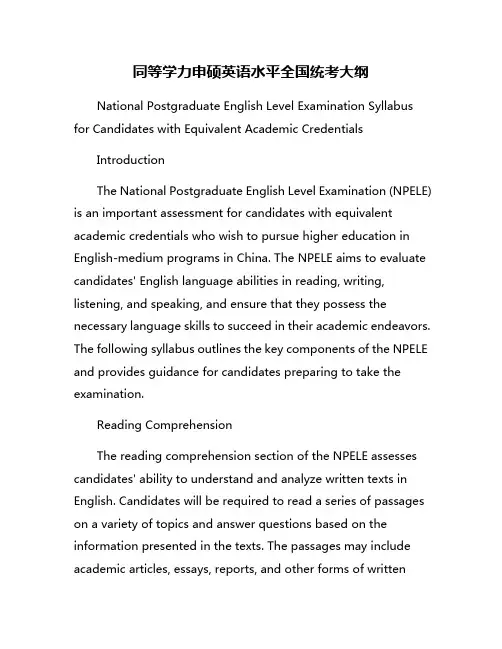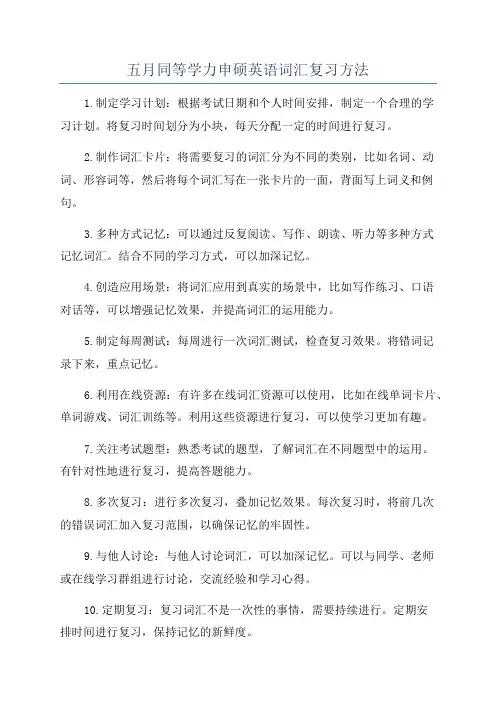【原创】同等学力申硕英语大纲第五版词汇手册(k)
同等学力英语词汇表

同等学力英语词汇表Part 11. abandonvt. 1. 丢弃;抛弃,遗弃2. 放弃,中止n. 放纵,放任;狂放[例句]:The crew abandoned the burning ship. 水手们离弃了燃烧中的船。
2. abound ?vi 1. 大量存在2. 富足[例句]:Wildlife abounds in the forest. 森林里多野生动植物。
3. absorb:vt. 1. 吸收(液体,气体,光,声等) 2. 汲取,理解(知识等)[例句]:Cotton gloves absorb sweat. 棉手套吸汗。
4. abstract:a. 1. 抽象的2. 难懂的,深奥的n. 1. 摘要,梗概2. 抽象派艺术作品[例句]:Some people say beauty itself is abstract. Do you agree? 有些人认为美本身是抽象的。
你同意吗?5. accelerate:vt 1. 使增速2. 促进;促使...早日发生vi. 1. 加快;增长;增加[例句]:The car suddenly accelerated.汽车突然加快了速度。
6. access:n. 1. 接近,进入;接近的机会,进入的权利;使用2. 通道,入口,门路vt. [电脑]取出(资料);使用;接近[例句]:Only a few people have access to the full facts of the case. 只有少数几个人能看到有关该案全部事实的材料。
7. accommodate:vt. 1. 能容纳; 能提供...膳宿2. (飞机等)可搭载[例句]:The hotel can accommodate 500 tourists. 这家旅馆可住五百名观光客。
8. accompany:vt. 1. 陪同,伴随2. 随着...发生,伴有vi. 伴奏,伴唱[例句]:Lightning usually accompanies thunder. 电闪通常伴着雷声。
原创同等学力申硕英语大纲第五版词汇手册k

Kkeen [ki:n]adj.锋利的; 热衷的, 热心的, 渴望(做某事); 激烈的, 紧张的;良好的; 敏锐的, 敏捷的This knife is very keen.这把小刀非常锋利。
He is not very keen on jazz.他对爵士音乐不太感兴趣。
The boy is keen to go to sea.这孩子很想去航海。
The parents were keen that their daughter should become musician.父母渴望他们的女儿成为音乐家。
She has a keen mind.她头脑机敏。
My daughter is keen of hearing.我的女儿听觉灵敏。
keep [ki:p]vt. & vi. & link v.(使)保持; (使)继续Please keep quiet.请保持安静。
The machine kept running.机器一直运转。
I think we shall keep friends.我想我们要保持朋友关系。
vi.(食品)保持新鲜The fish won't keep long; we must eat it now.这鱼无法保存很久, 我们必须现在就把它吃掉。
vt.保有, 保存, 保留; 阻止, 防止, 耽搁; 履行, 遵守Why didn't Daddy let me keep the ten dollars爸爸为什么不让我留下这十美元Will you keep us the seats你给我们保留座位好吗What kept you什么事耽误了你She kept her promise.她遵守了诺言。
keeper [‘ki:p?]n.饲养员;保管人;管理人,负责人He found a job as a keeper.他找到了一份当饲养员的工作。
Anglers are required to obtain prior authorization from the park keeper.垂钓者必须事先得到公园管理者的许可。
同等学力申硕英语水平全国统考大纲

同等学力申硕英语水平全国统考大纲National Postgraduate English Level Examination Syllabus for Candidates with Equivalent Academic CredentialsIntroductionThe National Postgraduate English Level Examination (NPELE) is an important assessment for candidates with equivalent academic credentials who wish to pursue higher education in English-medium programs in China. The NPELE aims to evaluate candidates' English language abilities in reading, writing, listening, and speaking, and ensure that they possess the necessary language skills to succeed in their academic endeavors. The following syllabus outlines the key components of the NPELE and provides guidance for candidates preparing to take the examination.Reading ComprehensionThe reading comprehension section of the NPELE assesses candidates' ability to understand and analyze written texts in English. Candidates will be required to read a series of passages on a variety of topics and answer questions based on the information presented in the texts. The passages may include academic articles, essays, reports, and other forms of writtencommunication. Candidates should be able to identify main ideas, supporting details, and infer meaning from context. They should also demonstrate an understanding of vocabulary, sentence structure, and rhetorical strategies.WritingIn the writing section of the NPELE, candidates will be asked to compose essays or short responses on assigned topics. Candidates should be able to express their ideas clearly and coherently, develop arguments logically, and support their claims with relevant evidence. They should also demonstrate a command of grammar, punctuation, and spelling. Candidates may be asked to write in a variety of genres, such as argumentative essays, opinion pieces, summaries, and reports.Listening ComprehensionThe listening comprehension section of the NPELE evaluates candidates' ability to understand spoken English in academic contexts. Candidates will listen to a series of audio clips, such as lectures, interviews, and conversations, and answer questions based on the information presented. Candidates should be able to comprehend main ideas, supporting details, and infer meaning from tone of voice, intonation, and context. Theyshould also demonstrate an understanding of vocabulary, pronunciation, and discourse markers.SpeakingThe speaking section of the NPELE assesses candidates' ability to communicate effectively in spoken English. Candidates will engage in a variety of tasks, such as giving presentations, participating in discussions, and responding to prompts. Candidates should be able to articulate their ideas clearly and confidently, engage in meaningful dialogue, and adapt their language to different contexts and audiences. They should also demonstrate fluency, pronunciation, and intonation.Preparation StrategiesTo prepare for the NPELE, candidates should familiarize themselves with the format and content of the examination, practice relevant language skills, and develop effective study habits. Candidates may use a variety of resources, such as textbooks, online materials, language courses, and practice exams. They should also engage in regular reading, writing, listening, and speaking activities to enhance their language proficiency. Additionally, candidates may benefit from seeking guidance from teachers, tutors, or language partners to receive feedback on their performance and improve their skills.ConclusionThe NPELE plays a crucial role in evaluating candidates' English language proficiency and ensuring that they are adequately prepared for their academic studies. By following the guidelines outlined in this syllabus and engaging in systematic preparation, candidates with equivalent academic credentials can enhance their language abilities and achieve success in the examination. It is essential for candidates to approach the NPELE with confidence, determination, and dedication in order to fulfill their academic aspirations and pursue their future goals.。
同等学力人员申请硕士学位英语水平考试大纲词汇手册

2005年图书目录
目录
02 内容简介 04 推荐
基本信息
《同等学力人员申请硕士学位英语水平考试大纲词汇手册》是2005年清华大学出版社出版的图书,作者是纪 飞。
主要讲述了本书以国务院学位委员会颁布的《同等学力申请硕士学位英语水平全国统一考试大纲》(第三版) 为依据,共收录英语水平考试常用词汇5600多个、固定搭配词组和惯用短语800余个;同时,还收录了考试大纲 以及完整考试样题(附答案)1套。
本书编排简单明了,特别便于考生系统地背读学词。读者对象为准备参加同等学力申请硕士学位英语水平考 试、硕士研究生入学考试和非英语专业硕士研究生英语学位课程考试的考生。
图书目录
图书目录
常用词汇 常用词组 考试样卷及答案 部分国家(或地区)、语言、国民及国籍表 常用地名表 常用缩写词表 常用前后缀 不规则动词表 主要参考文献
图书简介
图书简介
版 次:1页 数:427字 数:458000 印刷时间:2005-9-1开 本:纸 张:胶版纸 印 次:包 装:平装
内容简介
内容简介
本书以国务院学位委员会颁布的《同等学力申请硕士学位英语水平全国统一考试大纲》(第三版)为依据, 共收录英语水平考试常用词汇5600多个、固定搭配词组和惯用短语800余个;同时,还收录了考试大纲以及完整 考试样题(附答案)1套。
本书词汇皆出自于国务院学位委员会颁布的《同等学力申请硕士学位英语水平全国统一考试大纲》(第三版) 中的词汇表,在词义的释义上参考了历年来同等学力人员申请硕士学位英语水平考试试题,因而具有科学性和针 对性,有利于考生加深对考试内容的正确理解,从而对英语水平考试词汇进行系统的复习,并有效提高应试能力。 对每个词都标有音标,列出动词、名词、形容词和副词的不规则变化,注明名词的可数和不可数,便于读者学习 使用。
同等学力申硕英语词汇和考研英语词汇

同等学力申硕英语词汇和考研英语词汇The vocabulary required for the Postgraduate Entrance Examination in China is often considered more advanced and difficult compared to that of the National Postgraduate Entrance Examination for the students who have the same level of education and equal English proficiency. While both exams test students on their ability to understand and use English vocabulary, the emphasis and level of difficulty may vary between the two.For students preparing to take the postgraduate entrance exam with an equivalent level of education and English proficiency, they may find that the vocabulary tested in the exam is more challenging than that of the National Postgraduate Entrance Examination. This is because the postgraduate entrance exam is designed to assess students' ability to comprehend and analyze complex academic texts, which often require a higher level of vocabulary knowledge. Students may come across more specialized or academic terms in the postgraduate exam, which may not be as commonly used in everyday language.The vocabulary tested in the postgraduate entrance exam may also include words from various fields of study, such as economics, law, science, and technology. Students are expectedto be familiar with these terms and understand how they are used in context. In addition, students may need to demonstrate their ability to infer the meaning of unfamiliar words based on the context in which they are used, as well as their knowledge of word formation and collocations.On the other hand, the vocabulary tested in the National Postgraduate Entrance Examination may be more focused on general English language proficiency and may include a wider range of topics and everyday vocabulary. Students preparing for this exam may encounter words and phrases that are commonly used in both formal and informal settings, as well as in a variety of academic and non-academic contexts. They may also need to demonstrate their understanding of idiomatic expressions and figurative language, as well as their ability to use words accurately and appropriately in different contexts.In conclusion, while both the postgraduate entrance exam and the National Postgraduate Entrance Examination test students on their English vocabulary knowledge, the level of difficulty and emphasis may vary between the two exams. Students preparing for the postgraduate entrance exam may need to focus on acquiring a more advanced and specialized vocabulary, while those preparing for the National PostgraduateEntrance Examination may need to work on a wider range of topics and everyday vocabulary. Regardless of which exam students are preparing for, developing a strong and diverse vocabulary is essential for success in both exams.。
五月同等学力申硕英语词汇复习方法

五月同等学力申硕英语词汇复习方法
1.制定学习计划:根据考试日期和个人时间安排,制定一个合理的学
习计划。
将复习时间划分为小块,每天分配一定的时间进行复习。
2.制作词汇卡片:将需要复习的词汇分为不同的类别,比如名词、动词、形容词等,然后将每个词汇写在一张卡片的一面,背面写上词义和例句。
3.多种方式记忆:可以通过反复阅读、写作、朗读、听力等多种方式
记忆词汇。
结合不同的学习方式,可以加深记忆。
4.创造应用场景:将词汇应用到真实的场景中,比如写作练习、口语
对话等,可以增强记忆效果,并提高词汇的运用能力。
5.制定每周测试:每周进行一次词汇测试,检查复习效果。
将错词记
录下来,重点记忆。
6.利用在线资源:有许多在线词汇资源可以使用,比如在线单词卡片、单词游戏、词汇训练等。
利用这些资源进行复习,可以使学习更加有趣。
7.关注考试题型:熟悉考试的题型,了解词汇在不同题型中的运用。
有针对性地进行复习,提高答题能力。
8.多次复习:进行多次复习,叠加记忆效果。
每次复习时,将前几次
的错误词汇加入复习范围,以确保记忆的牢固性。
9.与他人讨论:与他人讨论词汇,可以加深记忆。
可以与同学、老师
或在线学习群组进行讨论,交流经验和学习心得。
10.定期复习:复习词汇不是一次性的事情,需要持续进行。
定期安
排时间进行复习,保持记忆的新鲜度。
以上是五月同等学力申硕英语词汇复习方法的一些建议,希望能对您有所帮助。
祝您考试顺利!。
同等学力人员申请硕士学位英语水平全国统一考试大纲词组表
同等学力人员申请硕士学位英语水平全国统一考试大纲词组表申请硕士学位的同等学力人员需要通过英语水平全国统一考试,这是一项重要的考试,目的是评估他们的英语水平是否达到进一步学习深造的要求。
为了能够顺利通过考试,了解并熟悉大纲词组表是非常重要的。
以下是同等学力人员申请硕士学位英语水平全国统一考试大纲词组表的相关内容:一、词组表简介1. 词组表的作用词组表是为了帮助同等学力人员准备英语水平考试,包含了考试中常见的词组,以及这些词组的中文翻译和用法。
通过学习和掌握词组表,同等学力人员可以提高他们的英语应试能力。
2. 词组的分类词组表按照不同的类别进行了分类,常见的类别包括:动词短语、名词短语、形容词短语、副词短语、介词短语等。
每个类别都包含了大量的词组,以满足同等学力人员的学习需求。
二、词组表详解1. 动词短语动词短语是指由一个或多个动词和其他成分组成的短语,常用于表达一种动作或状态。
在考试中,同等学力人员需要掌握一些常见的动词短语,例如:“take into account”(考虑到)、“deal with”(处理)、“pay attention to”(注意)等。
2. 名词短语名词短语是由一个或多个名词和其他成分组成的短语,常用于描述人、事、物等。
在考试中,同等学力人员需要了解一些常见的名词短语,例如:“a wide range of”(广泛的)、“the majority of”(大多数的)、“a major factor”(主要因素)等。
3. 形容词短语形容词短语是用于修饰名词或代词的短语,常用于表达事物的性质、状态、特征等。
在考试中,同等学力人员需要熟悉一些常见的形容词短语,例如:“essential for”(对于...来说是必要的)、“conducive to”(有利于)、“crucial to”(至关重要的)等。
4. 副词短语副词短语用于修饰动词、形容词、其他副词等,常用于表示时间、地点、方式、程度等。
同等学力人员申请硕士学位英语水平全国统一考试大纲(第五版)
同等学力人员申请硕士学位英语水平全国统一考试大纲(第五版)一、指导思想为了客观地测试以同等学力申请硕士学位人员(以下简称同等学力人员)的英语水平,保证学位授予的质量,根据《国务院学位委员会关于授予具有研究生毕业同等学力人员硕士、博士学位的规定》(1998年6月18日通过)和国务院学位委员会办公室1994年下达的《关于在职人员以同等学力申请硕士学位外国语课程水平统一考试的通知》的精神和要求,结合具有同等学力的在职人员学习英语的特点,在总结近几年来同等学力人员英语水平统一考试工作的基础上,特制订本大纲(第四次修订稿)。
研究生英语教学的目的,是使学生具有较好的用英语获取信息的能力和一定的用英语传递信息的能力。
这就要求考生具有较强的阅读理解能力和一定的听说能力,同时也必须具有一定的英语写作能力和翻译能力。
本考试旨在测试考生是否达到研究生英语教学大纲所规定的各项要求,具有研究生英语教学大纲所规定的各项语言运用能力。
二、评价目标本考试重点考查考生的会话技能、阅读、写作和翻译的能力(由于技术上的原因,本考试暂时取消听力测试,会话技能的测试采用书面形式进行。
考生听力能力的测试由各院校在考生学习期间进行)。
考生应在词汇知识、语法知识、会话技能、阅读理解能力、翻译能力和写作能力等方面分别达到以下要求:(一)词汇掌握约6 220个英语词汇和约600个常用词组(见附录一和附录二)。
对其中的2 360个积极词汇(词汇表中用黑体标注的词)要求熟练掌握,即能在会话、写作和翻译中准确地运用;其余词汇则要求能在阅读中识别和理解。
(二)语法掌握英语的基本语法知识、常用句型和结构,能正确理解包含这些知识、句型和结构的句子。
(三)会话能用英语进行日常会话。
对于生活、学习和工作中的常见英语会话,能理解会话的情景、说话人的意图和会话的含义。
能恰当地进行交流。
能正确理解英语口语中常见的习惯用法。
(四)阅读能综合运用英语语言知识和阅读技能读懂一般性题材的文章及科技文献。
同等学力申硕英语词汇LQ
同等学力申硕英语词汇带音标、释义完美整理版〔3〕L*label ['leib*labo(u)r ['leib] n.劳动;工人 v.劳动;费力地前进laboratory/lab[][] n. 实验室lace*lack [læk] v./n.缺乏,缺少,短缺lad[læd]n.少年,小伙子;(口)伙伴,老朋友;(英)管赛马房马夫;(俚)情人*ladder ['læd] n.梯子,阶梯lady ['leidi] n.夫人,女士;(pl.)女盥洗室*lag [læg] n.落后,滞后 vi.落后,走得慢lake [leik] n.湖,湖泊lamb [læm] n.小羊,羔羊;羔羊肉lame[] a. 跛,瘸 ,残废*land [lænd] n.陆地;土地;国家 v.使…着陆landlord ['lændl:d] n.地主,房东landmark ['lænd mɑ:k]n.[航]陆标;界标;里程碑;纪念碑a.有重大意义或影响landmine['lændmain] n.地雷,投伞水雷landscape ['lændskeip] n.风景,风光;风景画,风景照片lane [lein] n.小路,小巷;车道,跑道language[]lantern ['læntlap [læp] n.膝部;(跑道)一圈laptop['læp t p] n.便携式电脑*large [l ɑ:d] a.大 n.大[只用于短语]laser ['leizlash[l]v.系牢;鞭打;猛烈抨击 n.鞭打;眼睫毛*late [leit] a.迟;晚期;最近 ad.迟,晚*lately ['leitli] ad.最近,近来,不久前later ['leit] ad.后来,过一会儿Latin['lætn] n.拉丁文;拉丁语,拉丁文学;拉丁美洲人;拉丁姆人第 1 页a.拉丁,拉丁语;古罗马;拉丁姆;拉丁美洲latitude['l titju:d]n.纬度[ pl.]纬度地区;盘旋余地,自由*latter ['læt*laugh [lɑ:f] v.笑 n.笑(声)laughable ['læf b l, 'lɑ:f-] a.有趣,逗人笑;好笑;可笑laughter ['l ɑ:ft] n.笑,笑声*launch[]laundry ['l:ndri] n.洗衣店;洗好衣服,洗涤lavatory ['læv t ri] n.盥洗室,厕所*law [l:] n.法律;法规,法制;定律,规律lawful ['l :f l] a.合法,法定lawn [l:n] n.草地,草坪lawsuit ['l :su:t] n.诉讼;诉讼案件lawyer ['l :j*lay [lei] v.放置;覆盖;安置;产卵layer ['lei] n.层(次)layman['leim n]n.门外汉,外行layoff['lei f]n.(尤指临时)辞退layout ['leiaut] n.布局,安排,设计*lazy ['leizi] a.懒惰,懒散leader ['li:d] n.领袖,领导者leadership ['li:dleading ['li:di] a.最重要,首位;领导leaf [li:f] n.叶(子);张,页;薄金属片league [li:g] n.同盟,联盟;协会,社团leak [li:k] vi.漏;泄露出去 n.漏洞;泄露*lean [li:n] vi.倾斜;屈身;靠 a.无油脂,瘦leap [li:p] v.跳,跃;跃过 n.跳跃;飞跃*learn [l:n] v.学习,学会;得知,得悉;记住learned ['l:nid] a.博学,有学问learning['l :ni] n.学问,学术,知识;v.学习〔learn现在分词〕lease [li:s] n.租约,契约leather ['leð*lecture []n./v.演讲,讲课*left [left] a.左边 ad.向左 n.左面;(L-)左派left-handed[] a. 惯用左手leftist ['leftist] n.左派人;急进派;左撇子a.左派;左撇子;激进第 2 页leg [leg] n.腿(部)*legal ['li:gl] a.法律(上);法定,合法legalization [li:gəlai'zei n] n.合法化,认可legend['led nd]n.传说,传奇;传奇文学;传奇性人物或事件legislation [led is'lei n] n.立法;法规,法律legislative [led i'sleitiv] adj.〔关于〕立法;立法决定;有权立法,用以立法;立法机构;n.立法权;立法机关legislator [led i'sleitə] n.立法委员;立法者legitimate [li'dleisure ['le] n.空闲时间,闲暇;悠闲,安逸lemon[] n.柠檬;柠檬汁*lend [lend] vt.把…借给,贷给,出借*length [] n.长(度),距离;一段,一节lengthy[']adj.长,漫长;冗长;啰唆〔演说,文章等〕lens [lenz] n.透镜,镜头lesbian['lezbi n] a.女同性恋;莱斯博斯岛;n.女同性恋者;莱斯博斯岛人*less [les] a./ad.更少(地);较次(劣)(地)*lesson ['lesn] n.课业,功课,课程;教训,经历lest [lest] conj.唯恐,免得*let [let] vt.让,允许;设,使;出租letter ['let] n.字母,文字;信,函件*level ['lev l] n.水平面;等级 a.平,水平lever ['li:v]n.杠杆;控制杆,推杆levy['levi]vt.征收(税等) n.征税,税款liability [lai'biliti]n.责任,义务;(pl.)债务;倾向liable ['lai b患…;有…倾向;有偿付责任liaison ['li:ei z n, li:'ei-] n.联络,联络人;[语]连音;(尤指一方或双方已婚)私通;[烹]加浓料liar ['lailiberal ['lib r l] a.自由主义;大方;心胸开阔liberate ['lib reit] v.解放,使获得自由;释出,第 3 页放出*liberty ['lib ti] n.自由,释放;(pl.)准许(权),许可librarian [] n.图书馆馆长(或管理员)library ['laibr ri] n.图书馆,图书室;藏书license/-ence ['lais ns] n.执照;许可 vt.批准,发给…执照lick [lik] n./vt.舔lid [lid] n.盖(子)*lie [lai] vi.躺,平放;位于,在于 v.说谎 n.谎话lieutenant [lef'ten nt]n.陆军中尉;海军上尉*life [laif] n.生命;生物;寿命;生活lifetime ['laiftaim] n.终生, 一生*lift [lift] v.提升;(尤指云、雾)消散 n.举起;电梯*light [lait] n.光 v.点燃;照亮 a.轻;不费力lightning ['laitni] n.闪电lightweight['lait weit] a.轻量;不重要;n.轻量级选手;不重要人*like [laik] a.相像 prep.像,与…一样 v.喜欢,希望*likelihood[]n.可能, 可能性*likewise ['laikwaiz] ad.同样地,也*limb [lim] n.肢,臂,翼*limit ['limit] n.界限 vt.限制,限定limitation [limi'tei n] n.限制,限度;局限,弱点limited ['limitid] a.小,有限line [lain] n.线;电线;路线 vt.(使)排成行linear ['lini]a.线,直线,线状;长度;线性linen['linin]n.日用织品,亚麻织品;亚麻布liner ['lain] n.班船,班机linger['li g]vi.逗留,留恋徘徊;继续存留,缓慢消失linguistic[li'gwistik]a.语言,语言学*link [li k] n.环,联系 vi.连接,联系lion ['lailipstick['lip stik]n.唇膏,口红liquid ['likwid] n.液体 a.液体,液态liquor ['lik*list[]n.目录,名单,表 v.列表,排列*listen ['lis n] vi.听;听信,听从liter/tre ['li:t] n.升第 4 页literacy['lit r si]n.识字,有文化,读写能力literal['lit r l]a.照字面,原义;逐字literally ['lit r li]n.逐字地,照字面地;真正地;简直literary []a.文学,从事写作literature[] n.文学(作品);文献,图书资料litter['lit*little ['litl] a.小;不多 n.几乎没有 ad.毫不*live [liv] v.居住;生存 a.有生命 ad.实况地livelihood ['laivlihud] n.生计,谋生之道lively ['laivli] a.活泼;逼真liver ['liv] n.肝(脏)living ['livi] a.活着 n.生活,生计living-room ['livi'ru:m]n.客厅,起居室*load [] v.装载 n.装载量;负荷loaf [l uf] n.一条(面包)*loan [l un] n.贷款,暂借 v.借出,贷于lobby ['l bi] n.门厅,(饭店等)接待厅*local []a.当地,地方,本地;局部locality[l u'k liti]n.地区,地点*locate[]vt.把…设置在;探明location[] n.位置,场所*lock [l k] n.锁 v.(被)锁上locomotive[l uk 'm utiv]n.机车,火车头 a.运动;运载locust[]n. 蝗虫lodge [l d] vt.供…以临时住宿 vi.寄宿lofty['l fti]a.傲慢;崇高;高耸log [l g] n.原木,圆木;航海(飞行)日志*logic []n.逻辑(学);逻辑性*logical []a.逻辑,符合逻辑logo['l g] n.〔某公司或机构〕标识,标志,徽标;logotype缩略形式;[计算机] LOGO 教学语言;儿童教学语言*lonely []a.孤独,寂寞;荒凉,人迹稀少*long[]a.长();长时间 ad.长期地 vi.渴望longitude['l nd itju:d]n.经度*look [luk] vi.看;看起来 n.看;外表,脸色*loom[]vi.阴森地逼近,隐现;即将降临;n.织布机第 5 页loop[lu:p] n.圈,环;[医]宫内避孕环;回路;弯曲局部vt.& vi.〔使〕成环,〔使〕成圈;以环连结;使翻筋斗*loose [lu:s] a.松,宽松 v.释放,解开loosen ['lu:s n] v.解开,放松,松驰lord [l:d] n.贵族,老爷;领主,君主;(L-)上帝lorry ['l ri] n.卡车,货运汽车*lose [lu:z] vt.丧失;迷路;输掉 vi.赔本;失败*loss [l s] n.遗失;亏损;失败*lot [l t] n.许多,大量;签,抽签*loud [laud] a./ad.大声(地),响亮(地)lounge[laund] n.休息厅;客厅;〔机场等〕等候室vi.闲逛;懒洋洋地躺vt.懒洋洋地打发〔时间〕;虚度光阴*love [l v] vt.爱;爱好 n.爱,爱情,喜欢lovely ['l vli] a.美丽,得意;有趣,令人愉快lover ['l v] n.爱好者;情人*low [l u] a.低,矮;低下,低等*lower [] a.较低,下等 vt.放下,放低*loyal []a.忠诚,忠实*loyalty[] n.忠诚,忠心lubricate ['lu:brikeit] vt.润滑,加润滑油*luck[] n.运气;幸运,好运*lucky ['l ki] a.幸运,桔祥,幸运luggage[]n.行李luminous['lu:min s]a.发光,发亮,光明lump [l mp] n.块;肿块 vt.把…归并到一起lunar ['lu:n] a.月球,按月球运转而测定lunch [l nt] n.午餐,便饭luncheon['l nt n] n.午餐;午餐会;午宴;两餐之间吃一点食物lung []n.肺lure [lju, lu] n.吸引人东西,诱惑物 vt.引诱,吸引luxury ['l k ri] n.奢侈(品),豪华Mmachine [] n.机器,机械machinery [m 'i:n ri] n.(总称)机械,机器;机构*mad [mæd] a.疯;恼火;狂热,着迷第 6 页madam ['mæd m] n.(对妇女尊称)女士,夫人magazine [mæg'zi:n] n.杂志, 期刊*magic ['mæd ik] n.魔力;魔术 a.有魔力,不可思议magistrate['m d istreit, -strit]n.行政长官;治安法官magnet ['mægnit] n.磁体,磁铁magnetic [mæg'netik] a.磁性;有吸引力magnificent [mæg'nifis nt] a.壮丽,宏伟magnify ['mægnifai] vt.放大,扩大;夸大magnitude ['mægnitju:d] n.巨大,重大;大小,数量maid [meid] n.少女,未婚女子;女仆mailbox ['meilb ks] n.邮筒,邮箱mainland ['meinl nd] n.大陆,外乡mainstream ['meinstri:m]n.主流*maintain [mein'tein] vt.维持保持;保养维修;坚持,主张majesty ['m d isti]n.[M-]陛下;雄伟,壮丽,庄严major [] a.较重要n.主修课程;少校vi.(in)主修*majority []n.多数,大多数*make [meik] v.制造;使;迫使;获得;等于makeup ['meik*male [meil] n./a.男性(),雄性()malicious[]a.恶意,心毒mall [m :l, m l]n.(由许多商店组成)购物中心malpractice [m l'pr iman [mæn] n.男人;人,人类*manage ['mænid] v.管理,经营;设法(做到、完成);处理management ['mænid m nt] n.管理,经营;管理人员manager ['mænid] n.经理,主管人managerial [mæn 'd i]a.经理maneuver/manoeuvre[m 'nu:v]n.策略[ pl.]演习v.(巧妙)控制;用策略*manifest[]a.明显,明了;vt.显示,证明,说明;使显现,使显露*manipulate [m'nipjuleit] vt.操纵,利用,操作,巧妙地处理mankind [manly ['mænli] a.有男子气概 ad.男子般地,果断地man-made[]a. 人造,人工*manner ['mæn] n.方式;态度,举止;(pl.)礼貌第 7 页mansion['m n n]n.大厦,(豪华)宅邸*manual ['mænju l] a.手工;体力 n.手册,指南*manufacture []v.(大量)制造杜撰n.制造(pl.)制品manufacturer [mænju'fækt] n.生产厂商,制造公司,厂主manuscript ['mænjuskript] n.手稿,原稿*many ['meni] a.许多,多 pron.许多人或物,许多map [mæp] n.图,地图March [m ɑ:t*march [m ɑ:t] v./n.行进,进军*margin ['m ɑ:d in] n.页边,边缘;余地marginal ['mɑ:d in l]a.微小;仅以微弱多数获胜;有旁注marine [m'ri:n] a.海;航海 n.水兵;船舶,海运业*mark [mɑ:k] n.痕迹;记号;(考试)分数 v.弄污;标志*marriage ['mærid] n.结婚,婚姻;婚礼*married[]a.已婚, 婚姻*marry ['mæri] vt.同…结婚marsh [mɑ:] n.沼泽,湿地marshal ['mɑ:l]n.元帅;总指挥;(美)执法官 vt.整理,集结martyr['mɑ:]n.烈士,牺牲者;殉道者,殉教者;vt.牺牲,为信仰而受难或殉难marvel(l)ous ['m ɑ:v l s] a.奇异;了不起masculine['m skjulin]a.男性,男子;男子气mask [mɑ:sk] n.面具,面罩*mass [mæs] n.(大)团,块;大量,众多;(pl.)群众massacre ['m s k]massive ['mæsiv] a.巨大;大量;魁伟*master ['m ɑ:st] n.主人;能手;(M-)硕士 vt.掌握;控制masterful['m ɑ:st]a.好支配别人,专横mastermind['mɑ:st]masterpiece ['m st pi:s , 'mɑ:st pi:s]n. 杰作mat [mæt] n.席子,垫子*match [mæt] n.火柴;比赛;对手 v.(与…)相配mate [meit] n.伙伴;配偶 v.使…配对material []maternity[]n.母性,母道;怀孕mathematical[]a.数学,数学上;准确;可能性极小mathematics [mæθ第 8 页*matte r ['mæt] n.事情,问题;毛病,麻烦;物质,物品*mature[]maturity [m 'tju riti] n.成熟;完成;(支票、债券等)到期maximize []vt.使达最大或最高限度,增加(扩大)到最大值;非常重视,完全运用;求…最大值;vi.广义阐述;到达最大值,最大化maximum []n.最大量最高值 a.最大,最高*may [mei] aux.v.可能,也许;可以,被允许;祝,愿*maybe ['meibi:] ad.可能,也许mayor ['mme [mi:, mi] pron.[I宾格]我meadow ['medmeal [mi:l] n.一餐,膳食*mean [mi:n] v.表…意思;意为,意欲;意味着meaning ['mi:ni] n.意义,意思;重要性,目*means [mi:nz] n.手段,方法;财产,收入*meantime ['mi:ntaim] n.其时,在此期间 ad.同时,当时*meanwhile ['mi:n'wail] ad.当时,与此同时measurable[,可度量;重要,不容无视*measure[]n.量度;措施 vt.量 vi.有…长measurement ['me m nt] n.测量,衡量;尺寸,大小*mechanic [mi'kænik] n.技工,机械工人mechanical [mi'kænikmechanics [mi'kænik]n.力学;机械制造学;制造方法,构成法mechanism ['mek nizm] n.机械装置;机构,构造medal ['medl] n.奖章,勋章,纪念章*media[]*mediate[]v.仲裁,调停,作为引起…媒介,居中调停mediator['midieit]n.调解人,中间人;垂直中线*medical ['medik l] a.医学,医疗Medicare [medi'k]medicine [] n.药;医学,医术medieval [medi'i:v l]a.中世纪,中古(时代) medium []a.中等 n.媒介物;中间,第 9 页适中meeting ['mi:ti] n.会议,聚会melody ['mel di]n.曲调,旋律*melt [melt] v.(使)融化,(使)熔化;消散,消失member ['memb] n.成员,会员membership ['memb ip] n.成员资格,会员资格memorandum [mem 'rændmemorial [] a.纪念物,纪念碑,纪念馆;纪念仪式*memorize/-ise[]v.记忆,熟记,背熟*memory ['mem ri] n.记忆,记忆力;回忆,思念;存储(器)menace ['men s]vt./ n.有危险性人(或物);威胁,威吓*mend [mend] vt.修理,修补,补缀;纠正 n.修补,补钉*mental ['mentl] a.心智,精神;神经不正常*mention [] v.提到,谈到 n.提述,提及merchant [] n.商人mercury ['m:kjuri]n.水银(柱),汞;(the M-)水星*mercy []n.怜悯,宽恕,仁慈*mere[]a.仅仅,只不过merge [m :d]v.合并,结合,融合merger ['m :d] n.(企业等)合并merit ['merit] n.优点;功绩;价值 v.应得;值得*merry ['meri] a.愉快,欢乐mess [mes] n.混乱,混杂,脏乱*message ['mesid] n.消息,信息,口信;启示,要旨messenger ['mesind] n.送信人,使者*metal ['metl] n.金属,合金meter/-tre ['mi:t] n.米,公尺;仪表,计量器*method []n.方法,方法methodology [mi 'd l d i]n.(研究某一学科)一套方法metric ['metrik] a.公制,米制metropolitan[metr 'p lit n] n./a.大城市() microcomputer[] microphone ['maikr f un] n.麦克风,扩音器microscope[]microwave ['maikrmidday ['middei] n.正午,中午第 10 页*middle ['midl] n.中间;中等物 a.中间;中等midnight ['midnait] n.午夜,子夜midst['midst]n.中部,中间,当中Midwestmidwife*might [mait] aux.v.[may过去式] n.力量,威力migrant['maigr nt]n.移居者,移民;留鸟,迁移动物*migrate [mai'greit] v.迁移,迁居;定期移栖*mild [maild] a.温柔文雅;轻微;(烟、酒)味淡milestone ['mailstmilitant['milit nt]a.激进,好斗 n.激进分子,斗士*military[]militia [mi'limilky ['milki] a.牛奶,多奶;乳白色mill [mil] n.磨坊,面粉厂;工厂,车间miller ['milmillimeter/-tre ['mili mi:tmillion ['milj n] num.百万,百万个;n.(pl.)无数millionaire [milj 'ne]n.百分富翁*mind [maind] n.头脑;记忆;注意 v.注意;介意;照料mine [main] pron.[I物主代词]我 n.矿 v.开矿mineral [] n./a.矿物()mingle['mi g l]vt.使混合,使相混 vi.混合起来;相交往miniature ['mini t] n./a.缩小(),缩微minibus[mini b s] n. 小型公共汽车minimal ['minim l]a.最小,最低限度*minimize /-ise['minimaiz] vt.将减到最少,使降到最低*minimum ['minim m] n.最小量,最低限度minister ['minist] n.部长,大臣ministry ['ministri] n.(政府)部*minor ['mainminority [mai'n riti] n.少数;少数民族mint[mint]n.薄荷;铸币厂 vt.铸造(硬币);创造(词等)minus ['main s] a.减,负 prep.减去 n.减号,负号*miracle ['mir kl] n.奇迹,令人惊奇人或事*mirror ['mir] n.镜子;反映,反射 vt.反映,反射miserable ['miz r bl] a.悲惨,痛苦;可怜,糟糕第 11 页misery ['miz ri] n.痛苦,悲惨misfortune[mis'f :t n]n.不幸,厄运,逆境;不幸事故,灾难misguidemislead[mis'li:d]vt.误导,引入歧途*miss [mis] n.(M-)小姐 v.错过,未赶上;惦念,想念missing ['misi] a.失踪,欠缺,不在mission ['mi n] n.使命,任务;代表团missionary['mi n ri]n.传教士mist[] n. 雾mister['mist…为先生mistress ['mistris] n.女主人,主妇;情妇misunderstand(misunderstood)[] [] vt.误解,误会,曲解*mix [miks] v.混合;交往 n.混合物;迷糊;混合*mixture[]n.混合物;混合,混杂mo(u)ld[m ud]n.模子,铸模;性格,气质,脾气;霉菌;活土,壤土;vi.塑成;塑造,形成(性格,行为等)moan[m un]n.呻吟声,悲叹声,抱怨声 v.呻吟;抱怨mob [m b]n.暴民,乌合之众 vt.成群围住,聚众袭击mobile ['mmobilize/-ise ['mmock [m k] n.嘲弄,嘲笑*mode [m ud] n.方式,方法;样式,型*model ['m dl] n.模型,原型;模特儿;模范,典范;样式modem ['m udem]*moderate[]moderator[]n.调解人,仲裁人;调制器*modern[]a.现代,近代;新式,时新*modernize/-ise[]*modest[] a.谦虚,客气;适度modesty ['m**modify []vt.修改,变更;缓与,减轻module ['m dju:l] n.模数,模距;太空舱moist [m ist] a.潮湿,微湿moisture ['m ist] n.潮湿,湿度molecule ['m*moment []n.片刻,瞬间;某一个特第 12 页定时刻momentary['m um nt]a.刹那间,顷刻,短暂momentum[m u'ment m] n.气势,冲力;动量Monday ['mmonetary['m nit ri]a.钱,货币,金融*money ['m ni] n.货币;财富,金钱*monitor[] n.班长;监视器,监护仪 v.监听,监控monkey []monopoly [m 'n p li]n.垄断,独占;垄断商品monster ['m nst] n.怪物,妖怪*monthly[]a.每月 ad.每月一次 n.月刊monument ['m njum nt] n.纪念物,纪念碑,纪念馆;遗迹*mood [mu:d] n.情绪,心境;心境不佳moon [mu:n] n.月亮,月球;月光;卫星moon-cake月饼*moral[]a.道德上 n.道德,伦理;寓意morality [m'ræliti] n.道德,品行*more[]a.更多;另外 n.更多数量 ad.更;另外*moreover[]ad.此外,而且morning ['m :ni] n.早晨,上午mortal ['m:tl] a.致命;终有一死;人世间mortgage ['m :gid n.抵押;抵押契据 vt.抵押mosquito []n.蚊子most [m ust] a.最多;大局部 pron.最大量 ad.最mostly ['m ustli] ad.主要地,多半,通常motel [m u'tel] n.(附有停车场)汽车旅馆mother ['m ð] n.妈妈,母亲motherhood[]n.母性,母亲身份*motion [] n.移动;手势;(会上)提议 v.打手势,示意*motivate[]vt.鼓励,鼓励;作为…动机,促动motive ['m utiv] n.动机,目;(作品)主题motor [] n.电动机,马达;机动车,汽车motorbike[]n. 摩托车motorway ['wei] n.高速公路,快车道*mount [maunt] vi.增长 vt.登上;扶上马(车) n.…山峰mountain ['mauntin] n.山,高山;(pl.)山脉;大量mountainous[]a. 多山mourn[m:n]v.哀悼;(对…)感到痛心(或遗憾)mouse [maus] n.老鼠;胆小怕事人;鼠标第 13 页moustache[m'stɑ:]n.髭,八字须*move [mu:v] vt.移动;感动 vi.移动;运行n.走棋;步骤movement ['mu:vm nt] n.运动;举动;(群众性)运动movie ['mu:vi] n.影片,电影院*much[]a.许多 pron.许多 ad.很;几乎,大概mud [m d] n.泥,泥浆muddy ['m di]a.多泥;混浊;糊涂mug [m g] n.(有柄)大杯multicultural [m lti'k lt rl] a.多种文化,融有多种文化multilateral [m lti'l t rl] a.多边,多国参加multinational[m lti'n nl] a.多国,跨国,多民族multiple ['m*multiply []v.乘;做乘法;增加*multitude ['m ltitju:d]n.众多,大量;大群,群众municipal[mju:'nisip l]a.市,市政*murder []n.谋杀;谋杀罪 vt.谋杀,屠杀;破坏murmur['m :m]v./ n.小声说(话);小声抱怨,咕哝muscle ['m sl] n.肌肉;体力,力量muscular['m skjul]a.肌肉兴旺,强壮;(有关)肌(肉)museum [mju:'zimushroom []music ['mju:zik] n.音乐,乐曲musical ['mju:zikmusician [mju:'zi n] n.音乐家,乐师,作曲家*must [m st] aux.v.必须,应当;必定会;很可能簗mute [mju:t] a.哑,沉默 n.哑巴;弱音器mutter ['m t*mutual [] a.相互,彼此;共同my [mai] pron.[I所有格]我myself [mai'self] pron.[反身代词]我自己;我亲自*mysterious[]a.神秘;难理解*mystery []n.神秘,奥秘;神秘事物第 14 页Nnail[]n. 钉,钉子naive[na:'i:v]a.幼稚,轻信;天真*naked[]a.裸体,裸露;无掩饰,未遮盖name[]n.名,名字,名称,姓名;名声,名誉;名人namely[]ad.即,就是,换句话说napkin ['nnarrative ['n r tiv]n.表达文,故事;表达,讲述*narrow[]a.狭窄;范围小;眼光短浅,有偏见*nasty[]a.极令人不快;很脏;危险nation[]n. 民族,国家*national[]n.国民(指侨居国外);a.全国性;国内;民族;国有nationalism[]n.民族自尊心,爱国心,国家主义,民族主义,国家独立主义nationalist[]n.国家主义者,民族主义者;a. 国家主义,民族主义nationality[]n. 国籍*native[]a.出生地;外乡;天生;n.本地人,本国人;土著*natural[]a.自然界,天然;正常,惯常;天赋,天生*nature[]n.自然界,大自然;性质,本性naval[]a. 海军,军舰navigation[]n.航行,航海,航空;领航,导航,指引行车路线;航运,水上运输navy[]n. 海军*near[]a.近;亲密 ad.接近,靠近;差不多,大约nearby[] a. 附近*nearly[]ad.几乎,差不多*neat[]a.整洁;匀称;纯洁necessarily[] ad. 必定地,必然地第 15 页*necessary[]a.必要;必然n.(pl.)必需品necessitate [ni'sesiteit]vt.使成为必要,需要*necessity[]n.需要;必然(性);必需品neck[]n. 颈,脖子*need[]n./v.需要,缺少 aux.v.需要,必需needle[]n. 针*negative[]a.否认;拒绝;反面,消极;阴性;负;n.底片;负数*neglect[]vt.疏忽,无视,忽略neglectful[]a. 疏忽,不留心negligible ['neglid b l]a.可忽略不计,微缺乏道negotiable[]a.可谈判,可商量;可通行,可应付,可兑现(支票等)negotiate[]vt.谈判,协商,商谈;商定,达成协议;negotiation[]n.谈判,协商,商谈Negro[]n.黑人,黑人后裔neighbo(u)r[] n. 邻居,邻人neighbo(u)rhood[d]n. 四邻;邻近地区*neither[]nerve[] a. 紧张不安*nervous[]a.紧张不安,害怕;神经(方面)nest[] n. 巢; 窝net[]n. 网network[] n. 网络,网状系统neutral[]a.中间有;浅色,无色,非彩色;中性,中与;n.中立国. neutralize[]vt.使中立,使无效,使抵销;使中与;压制*never[]ad.永不,从不,决不,从来没有*nevertheless []conj.然而,不过 ad.仍然,不过第 16 页*new []a.新,新近;新来;不熟悉*news []*newspaper []*next []*nice []a.美好,令人愉快;友好,亲切nickel['nik l]n.镍;(美国与加拿大)五分钱nickname['nik…起绰号,叫…绰号niece[] n. 侄女,甥女night[] n.夜晚,夜,晚上;睡得好night-club['] n.夜总会nightmare['] n.梦魇,可怕事件nil[nil]n.无,零nine []num. 九nineteen[] num. 十九ninety[] num. 九十ninth[] num. 第九nitrogen[]n.氮no[]ad.不,不是;毫不*noble []a.nobody[] n.渺小人物; pron. 没有人,nod[] vi.点头*noise []n.噪声,喧闹声noisy[]a. 喧闹,嘈杂nominal['n minl]a.名义上;象征性;名词性nominate ['n mineit]vt.提名,任命nominee[n mi'ni:] n.被提名者,被推荐者*none []*nonetheless []adv.虽然如此, 但是nonprofit[]a.非赢利性,无利可图nonsense[]n.无意义话,胡扯;愚蠢行为noodle[]n.面条noon[n]n.中午,正午;全盛期,顶点*nor []conj.也不*norm[]n.标准,标准;平均数*normal[]a.正常,标准;精神健全normalize l[]vt.使标准化,使正常化第 17 页north[] a. ad & n.北(); 在/朝/从/向北northeast[]n.东北(部) northern[]a.北方,北部northwest[]n. 西北nose[n uz]n.鼻子;干预;嗅觉not[]ad.不,一个也不,没有notable ['n ut b l]a.值得注意,著名 n.名人,要人notation[n u'tei n]n.记号,标记法*note []n.笔记,记录;注释,按语;便条;纸币;名望;vt.记下,摘录;注意到notebook[] n. 笔记簿noteworthy[nothing[]pron.没有什么,没有东西;n.无价值人(事);ad.绝不,并不,毫不*notice []n.noticeable[]a.显而易见,值得注意notify[]vi.正式通知(某人)*notion []n.概念,意念;想法,见解notorious[n u't :ri s]a.臭名昭著,声名狼藉notwithstanding [n twiθ'st ndi]prep./ad.尽管noun[nourish['n ri]vt.养育,喂养,滋养;怀有,增强novel[] n. (长篇)小说novelist[]n. 小说家novelty['n v lti]n.新奇事物;新奇(感);新颖廉价物品November[]n. 11月now[]ad.现在,目前;从现在起,到现在为止;n.现在,此刻nowadays[]ad. 当今,现在*nowhere []*nuclear []a.原子核;核心,中心nucleus[]n. 中心,原子核,细胞核nuisance[]n.讨厌人(事)第 18 页*number []n.数,数字;号码numerical[nju:'merik l]a.数字,用数字表示,数值*numerous []a.为数众多,许多nurse[]n. 护士;保育员nursery[] n. 托儿所*nurture []v.养育;训练,教育,开展nut[]n.坚果,坚果仁(胡桃,栗子等)nutrition[nju:'tri n]n.营养nylon[]n.尼龙;长筒尼龙丝袜Oo'clock[']n. 点钟oak [uk] n.橡树,橡木oath [uθ]n.誓言,誓约;咒骂,诅咒语obedience['bi:dj ns]n.服从,遵照*obedient[] a.服从, 孝顺obese[u'bi:s]obesity[u'bi:siti]*obey ['bei] vt.服从,顺从*object[]n.物体;目;对象 v.不赞成,反对*objection []n.反对,异议*objective []a.客观 n.目标,目*obligation []n.义务,职责;恩惠oblige ['blaid] vt.迫使;施恩于;使感谢obscene[]a.猥亵,淫秽obscure [b'skju]a.难懂;不著名,无名;vt.遮掩,使模糊,使朦胧*observation []n.观察,注意;观察力;评论,意见*observe []vt.注意到,观测;遵守;说;纪念observer [] n.观察者,观察员;评述者*obsession []n.沉溺于,〔贪婪〕占有*obstacle[]*obtain []*obvious []a.明显,显而易见*occasion[]n.时机,时刻;大事,节日第 19 页occasional ['kei n l] a.偶然;特殊场合occupation [kju'pei n] n.职业,工作;占用,占领;消遣occupational [kju'pei n l]adj.职业;军事占领*occupy[] vt.占,占用;占领;使忙碌*occur [] vi.发生;出现,存在occurrence['k r ns] n.发生,事件,出现ocean []October[]*odd[]*odds[]odour['ud*of []prep.…;…之中;…做*off[] ad./a.脱隔();离去 prep.从…离开*offend [] vt.冒犯,触怒;使不悦offense ['fens] n.过错;冒犯;引起反感东西*offensive []a.极讨厌,令人作呕;进攻*offer[] vt.提供;表示愿意做;奉献 n.提供;报价*office[] n.办公室;效劳处;官职officer ['fis] n.官员,办事员;军官*official[]a.官方;官员 n.官员,高级职员*offset[]v.抵消,抵抗,使…平衡offspring['f spri]n.子女,子孙,后代;(动物)崽*often [] ad.经常,常常oil [il] n.油,石油 vt.给…加油oily['ili] adj.油,油质;含油,油多;油腻;油滑,会奉承okey /okay/o.k./ok[ou'kei] a./ad.对,好,可以 n.同意,许可*old [;…岁;长时间;过去olive['liv]n.橄榄,橄榄树omission[]n.省略,删节;遗漏;疏忽;[法]不履行法律责任*omit [] v.省略,删去;忽略,忘记*on [n] prep.在…上;朝向;关于 ad.向前;穿着*once [wone [w n] num.一 pron.一个人 a.一个;同一第 20 页oneself[] pron.[反身代词]自己;亲自ongoing ['n g uionion ['njonline[] n.联机;在线*only []onset []n.攻击,袭击;开场,动手;[医]发病onto [] prep.到…上onward ['nw d] ad./a.向前()*open [] a.开(着);开阔 vt.开场 vi.裂开;开场opener []n.开…人;开启用工具opening []n.洞;最初;空地;(职位)空缺opera[]*operate []v.操作;起作用;动手术*operation [] n.操作;作用;手术;运算operational [l] a.操作,动作operator[] n.操作员;(总机)接线员;(外科)手术员*opinion [] n.意见,看法;舆论,评价opinionated[]a.<贬>固执己见,武断;自用;师心自用opium[]n.鸦片;麻醉剂*opponent []a.对立,反对 n.对手,敌手*opportunity []n.时机,时机*oppose []*opposite[]a.对面 ad.对立面 prep.在…对面opposition[]n.(强烈)反对,敌对;(政府)反对党,在野党;对抗,抵抗;相对,对照;a.反对,对抗第 21 页oppress []vt.使烦恼,使意气消沉,使气馁,使无精神;压迫,压制;v.虐待,欺侮;(古)压倒;给与沉重感觉optic['ptik] a.眼睛,视觉;光学;镜片optical ['ptikl] a.光学;视觉,视力optimism['ptimiz m] n.乐观,乐观主义optimistic [pti'mistik] a.乐观,乐观主义optimum ['ptim m]n.最适条件,最正确效果,最优化*option []n.选择,供选择事物*optional []a.可以任选,非强制*or []conj.或者,还是;不然,否那么;或者说,即oracle [':r k l, 'r-] n.神示所;神谕;圣贤;哲人oral[]a.口头,口语;口(部)orange ['rind] n.橙(树);橙色 a.橙;橙色orbit ['orchestra [':kistr*order []orderly [':d li] a.整齐,有条理*ordinary [':din ri] a.普通,平常;平凡ore [:] n.矿石,矿砂*organ[] n.器官;机构;风琴organic [:'gænik] a.有机物,有机体;器官organism [':g niz m] n.生物,有机体organization/-isation[]n.组织,安排;团体;有机体*organize /-ise ['] vt.组织,安排;筹办*orient []vi.向东 vt.使适应,确定方向oriental[:ri'entl]东方,东方人,东方文化orientation [:ri n'tei n]n.方向,目标;熟悉,适应,情况介绍*origin [] n.起源,开端;出身,血统original ['rid n l] a.最初;新颖 n.原作品;原型originality [rid'næliti] n.创造力,独创性;新颖originate['rid ineit] vi.起源,发生 vt.创造;首创,创始第 22 页ornament [':n m nt]orthodox [':θd ks]a.传统;正统,正宗*other[]*otherwise []ouch[aut] int.〔痛苦或惊讶时叫声〕哎哟*ought [] aux.v.应该,本应ounce[au] n.盎司;少量our ['au] pron.[we所有格]我们ours [] pron.[we物主代词]我们ourselves [] pron.[反身代词]我们自己;我们亲自oust[aust]vt.罢黜,罢免,把…撤职(以取而代之)outbreak ['autbreik]n.(战争等)爆发,(疾病等)突然发生*outcome []n.结果,后果,成果outdate[aut'deit]vt.使过时,使落伍,使过期,使被废弃*outdoor[]a.户外,露天,野外*outdoors [] ad.在户外,在野外outer ['aut] a.外部,外层outfit ['aut fit]n.(为特殊用途)全套装备;全套服装outflow['autfl u] n.流出(物);(感情)爆发outgoing['autg ui] a.出发,即将离职;开朗,好交际,友善;n.出发,开销*outlet ['autlet] n.出口,出路,通风口*outline ['autlain] n.轮廓;提纲 vt.画出轮廓;概括outlook ['autluk] n.风光,风光;观点,见解;前景,前途outpost['autp ust] n.前哨,前哨阵地*output ['autput] n.产量;输出功率;排出量outrage ['aut reid] n.暴行;失礼;震怒 v.使(某人)震怒outreach[aut'ri:t]outset ['autset] n.开端,开场outside [aut'said] n./a.外面() ad.在外面 prep.在…外outsider [aut'said] n.局外人,外人;第三者,生人*outstanding [aut'stændi] a.出色;未解决outwards ['autwoval ['uv第 23 页oven ['vn] n.烤箱,炉灶*over ['*overall[]a.全面 n.(家里穿)宽大罩衫overcoat []n.外衣,大衣*overcome[] vt.战胜,压倒overflow ['fl u] v.(使)溢出;涌出 n.泛滥;过剩;超出额overhead []overhear [uv 'hi]vt.无意中听到,偷听到*overlap[]v.(与…)局部重叠(一样);n.重叠,重叠局部*overlook [uv'luk] vt.眺望,俯瞰;忽略,漏掉;宽容overnight ['uv'nait] ad./a.通宵(),一夜() overpass['uv pɑ:s] n.天桥,立交桥*overseas ['uv'si:z] ad./a.到国外();到海外(去)oversee [uv'si:] vt.监视oversight ['uv sait] n.疏忽,忽略overstate[uv'steit] vt.把…说得过分overt [u'v:t]a.公开,不隐蔽*overtake []vt.追上,超过;突然袭击overthrow['uvθr u] n.推翻,打倒 vt.推翻,打倒overtime ['uvoverturn[uv 't:n]v.(使)翻转(倾覆,倒下);颠覆,推翻overwhelming [uv 'welmi]a.势不可挡,压倒*owe [u] vt.欠(钱、情意);感谢owing ['ui] a.欠着;应给予owl [aul]n.猫头鹰*own[] ;;owner[] n.所有人,物主ownership[] n.所有权,所有制ox [ks] n.牛;公牛oxide ['oxygen [] n.氧, 氧气ozone ['uz un]n.臭氧;(海岸等)新鲜空气P*pace [peis] n.一步;速度 v.踱步,用步子测量*pack [pæk] n.包;一群 v.包装;塞满package ['pækid] n.包裹;包装用品 vt.打包,包第 24 页装packet ['pækit] n.小包裹,小捆pact [pækt] n.协定,条约;契约page [peid] n.页,张*painful ['peinf l] a.疼,痛苦;费力,费心*paint [peint] v.绘;给…上油漆 n.绘画作品;油漆painter ['peint] n.油漆匠,画家painting ['peinti] n.绘画,油画*pair [pepalace ['pælis] n.宫殿,华美大厦*pale [peil] a.淡,暗淡;苍白,灰白palm [pɑ:m] n.手掌,手心;棕榈(树)pamphlet['pæmflet] n.pan da ['pændpanel ['pænl] n.方格;仪器板;讨论小组panic ['pænik] n./a.恐慌() v.(使)恐慌*paper ['peip] n.纸;报纸;文章;考卷;票据paperback ['peip b k]n.平装本,简装本paperwork[]n. 日常文书工作parachute ['pærparade [p'reid] n./v.游行;检阅paradise ['pærparagraph ['pær grɑ:f] n.段,节;(报刊)短讯*parallel ['pær lel] a.与…*paralyze/-yse[]vt.使麻痹,使瘫痪;使丧失作用;使惊愕,使呆假设木鸡parameter [p 'r mit]n.[常pl.]界限,范围;参数parasite ['pær*pardon ['pɑ:d n] n./vt.原谅,饶恕,赦免parent ['pe r nt] n.父亲,母亲;动(植)物母体;起源parental[p'rentl] a.父母;亲代;[生]〔杂种〕亲本;作为来源[渊源]*park [pɑ:k] n.公园;停车场 v.停放(车辆) parliament ['p ɑ:l m nt] n.议会,国会parliamentary [pɑ:l 'm nt]a .议会,国会,议会制度*part [pɑ:t] n.局部;一方;职责 vt.分 vi.分开;断裂partial ['p ɑ:l] a.局部;不公平;偏爱…第 25 页participant [p ɑ:'tisip nt] n.参加者,参与者*participate [pɑ:'tisipeit] vi.参与,参加;分享,分担participation [p ɑ:tisi'pei n] n.参加,参加particle ['pɑ:tikl] n.粒子,微粒;极小量*particular [p 'tikjul] a.特别;挑剔 n.(pl.)细节partition[pɑ:'ti n]n.分开;隔板,隔开 vt.分割,隔开*partly ['pɑ:tli] ad.局部地,在一定程度上*partner ['p ɑ:tn] n.合作者;配偶*party ['pɑ:ti] n.社交聚会;党;一组,一伙人*passa ge ['pæsid] n.通道;通过;段落;航行passenger ['pæsind] n.乘客,旅客passersby[] n. 过客,过路人passion ['pæn] n.激情,热情;爱好,热爱*passive ['pæsiv] a.被动;消极passport ['p ɑ:sppassword ['p ɑ:sw*paste [peist] n.糊,浆糊 v.粘,贴pastime ['pɑ:staim] n.消遣,娱乐pastry['peistri]n.油酥面团,酥皮糕点pasture ['pɑ:st]n.牧草地,牧场 vt.放牧pat [pæt] n./v.轻拍,轻打;抚摸patch [pæt] n.补钉;斑片;小块土地 vt.补,修补patent ['peitpath [pɑ:θ] n.小路,小径;路线,轨道,路程pathetic [p'θetik]a.差劲;可怜,可悲*patience ['pei ns] n.忍耐,耐心*patient ['pei nt] n.病人 a.有耐心,能忍耐patriot['p tri t]n.爱国者,爱国主义者*patriotic[p tri'tik]patriotism['p tri tiz m] n.爱国心,爱国主义,爱国精神patrol[p 'tr ul]n.巡逻,巡逻队 v.巡逻,巡查patron ['peitr n] n.保护人,赞助人*pattern ['pætn] n.图案;形式;模范 vt.仿制,模仿*pause [p:z] n./vi.中止,暂停pave [peiv] vt.铺,铺设paw [p*pay [pei] v.支付,缴纳;付清;给予 n.薪水,工钱第 26 页*payment ['peim nt] n.支付,支付款项*peace [pi:s] n.与平;安宁*peaceful ['pi:sf l] a.与平;安宁;与平时期peach [pi:t] n.桃(树)peak [pi:k] n.山顶;最高点 a.最高,顶峰peanut ['pi:npear [p] n.梨(树)pearl [ppeasant ['pez*peculiar [pi'kju:lj] a.特有,特别;奇怪peculiarity [pi kju:li'æriti] n .特性,特质,怪癖,奇特pedal ['ped l]n.踏板 vi.踩踏板,骑车 vt.脚蹬,踩动pedestrian[pi'destri n]n.步行者,行人peer [pi] v.偷看,窥探 n.同辈,伙伴penalty ['penlti] n.处分,罚款*pendulum[]n.钟摆, 摇锤penetrate ['penitreit] v.穿透,渗入,看穿penguin ['pe gwin]n.企鹅peninsula [pi'ninsjulpension ['pen n] n.抚恤金,养老金,津贴*people ['pi:pl] n.人,人们;人民;民族pepper ['pep] n.胡椒;辣椒*per [p:] prep.每,按照*perceive [p'si:v] vt.发觉,感知;领悟percent [p之…*percentage [] n.百分数,百分比,百分率perception [p 'sep n] n.知觉,知觉力;理解,认识*perfect ['p :fikt, pperfection [p 'fek n] n.完全,完美;完成,改善*perform [p 'f:m] v.履行,完成,做;演出,表演*performance [p 'f :m ns] n.履行,完成;演出,表演perfume['p:fju:m, p'fju:m]n.香水(料,气) vt.使充满芳香;洒香水第 27 页。
新东方在线同等学力英语第五版大纲核心词汇表
admit
15 accept 16 acceptable 17 access 18 accommodate 19 accompany 20 21 22 23
accomplish accord according to account
vt.1.接受,领受;2.认可,同意 vi.同意,
47 adopt 48 advance
vi.前进,进展;n.1.发展,前进;2.预付
n.进入的机会,进入的条件,进入的权利等 49 advanced vt.1.为…提供住宿;2.容纳,接纳;3.使适
24 accountable 25 26 27 28 29 30 31
accumulate accurate accuse achieve acid acknowledge acquaint
50 advantage 51 advent vt.1.陪伴,陪同;与...同时发生;2.为…伴 52 adventure 奏 53 advertise vt.完成,实现,成就 54 advice v.互相符合,相一致 55 advise prep.按照,根据 56 vi.计算、记录、计数;n.账户,账目advocate 57 affair adj.可解释的,可说明的,可理解的;负责任
vt.1.任命,委派;2.指定,约定(时间、
132 appreciate
vt.1.评价,鉴别;2.欣赏,赏识;3.感谢
a.模棱两可的,意思含糊的,引起歧义的 133 appreciation
vt.1.走近,接近;2.处理,对待;vi.临 观点 a.合适的,适当的 n.1.同意,赞同;2.批准,认可 vt.批准,认可 vi.赞成,满意 a.大致的,近似的 vi.接近,近似 adv.大约地,近似地
- 1、下载文档前请自行甄别文档内容的完整性,平台不提供额外的编辑、内容补充、找答案等附加服务。
- 2、"仅部分预览"的文档,不可在线预览部分如存在完整性等问题,可反馈申请退款(可完整预览的文档不适用该条件!)。
- 3、如文档侵犯您的权益,请联系客服反馈,我们会尽快为您处理(人工客服工作时间:9:00-18:30)。
Kkeen [ki:n]adj.锋利的; 热衷的, 热心的, 渴望(做某事); 激烈的, 紧张的;良好的; 敏锐的, 敏捷的This knife is very keen.这把小刀非常锋利。
He is not very keen on jazz.他对爵士音乐不太感兴趣。
The boy is keen to go to sea.这孩子很想去航海。
The parents were keen that their daughter should become musician.父母渴望他们的女儿成为音乐家。
She has a keen mind.她头脑机敏。
My daughter is keen of hearing.我的女儿听觉灵敏。
keep [ki:p]vt. & vi. & link v.(使)保持; (使)继续Please keep quiet.请保持安静。
The machine kept running.机器一直运转。
I think we shall keep friends.我想我们要保持朋友关系。
vi.(食品)保持新鲜The fish won't keep long; we must eat it now.这鱼无法保存很久, 我们必须现在就把它吃掉。
vt.保有, 保存, 保留; 阻止, 防止, 耽搁; 履行, 遵守Why didn't Daddy let me keep the ten dollars?爸爸为什么不让我留下这十美元?Will you keep us the seats?你给我们保留座位好吗?What kept you?什么事耽误了你?She kept her promise.她遵守了诺言。
keeper [‘ki:pə]n.饲养员;保管人;管理人,负责人He found a job as a keeper.他找到了一份当饲养员的工作。
Anglers are required to obtain prior authorization from the park keeper.垂钓者必须事先得到公园管理者的许可。
kettle [‘ketl]n.(烧水用的)壶Put the kettle on, and I'd like a cup of tea.把壶烧开, 我要喝杯茶。
key [ki:]n.钥匙;键;曲调; 口吻, 基调;题解, 答案I've left my keys at home and can't get my books.我把钥匙丢在家里了, 我的书拿不着了。
I wish that she would not hit the keys of the typewriter so hard.我真希望她不要那么用力敲打字机键盘。
This piece changes key many times.这首曲子有多处变调。
Her speech was all in the same key.她的演说自始至终是一个基调。
I don't know the key to the puzzle.我不知道这个谜语的答案。
vt.用键盘输入;调音;使某事物与他事物相似[相适应]I have keyed this sentence three times, and it's still wrong!我把这个句子输入了三次, 可是仍然不对。
It was he who keyed the door yesterday.正是他昨天用钥匙锁门的。
keyboard [‘ki:bɔ:d]n.(打字机, 钢琴等的)键盘I bought a keyboard in the supermarket yesterday.昨天我在超市上买了个键盘。
kick [kik]vt. & vi.踢The baby was kicking and screaming.这婴儿又踢又叫。
The man kicked the door shut.那男人一脚把门踢上了。
n.踢;极度兴奋, 快乐;精力, 效应He gave the ball a kick.他把球猛踢了一下。
I get a big kick from[out of] motor racing.我觉得赛车很刺激。
He has no kick left in him.他已筋疲力尽。
kid [kid]n.小孩; 年轻人;小山羊; 小山羊皮Tell that kid to stop making so much noise.告诉那孩子小点声。
vt. & vi.欺骗, 戏弄, 取笑Don't take any notice of him; he is kidding around.别理他, 他不过是在胡闹。
kidnap [‘kidnæp]vt.诱拐, 绑架, 劫持His son was kidnapped yesterday.他儿子昨天被绑架了。
kidney[‘kidni]n.肾, 肾脏;个性,脾气;类型She got a very dangerous disease of kidneys.她得了一种很危险的肾病。
I hoped that he would not prove of similar kidney.我希望他最终将证实不是同一类型的人。
kill [kil]vt. & vi.杀死These flowers kill easily.这些花很容易枯死。
I was almost killed in the fighting.在战斗中, 我差一点儿被杀死。
vt.使停止[结束, 失败];破坏, 减弱, 抵消This has killed my hopes.这毁灭了我的希望。
One colour may kill another near it.一种颜色可能使相近的颜色显不出来。
killer [‘kɪlə]n.凶手;杀人者;致命物;消灭…者;摧毁…者He is a hired killer.他是一个受雇的杀手。
Heart atta cks have become Britain’s No. 1 killer disease.心脏病已成为英国的头号致命疾病。
Overdoses were the single biggest killer among the city’s young. 吸毒过量是城市年轻人唯一的最大杀手。
He plays well but still lacks the killer instinct. 他球打得非常好,但还缺乏杀气。
kilometer [‘kilə’mi:tə]n.〈美〉千米, 公里kilometer post里程标kilometer stone里程碑kilometer wave千米波kilogram [‘kiləuɡræm]n.千克Apple costs five dollars a kilogram.苹果每千克5美元。
kilowatt[‘kɪlə‘wɔt]n.千瓦decibels above kilowatt <电工>千瓦分贝wattless kilowatt无功千伏安kin [kin]n.亲戚, 家族What kin is he to you?你和他是什么亲戚关系?Marriage between close kin is prohibited. 禁止近亲结婚。
Ties with extended kin vary from family to family. 大家庭成员的关系因各家庭而异One of the drivers was fatally injured; his next of kin has been informed. 其中一名司机受了致命伤,已通知了他的近亲。
kind [kaind]adj.亲切的, 和蔼的, 友好的, 仁慈的The kind old man is accompanied all the time.这位和蔼的老人一直有人陪伴着。
He is kind and friendly despite his rather bluff manner.他为人厚道,待人亲切, 虽然态度有点粗鲁。
She was kind and generous.她心地善良, 宽容大量。
They were exceedingly kind.他们极为客气。
She has been very kind about letting us use her house.她十分友好, 让我们使用她的房子。
Be kind to animals.对动物要仁慈。
Be kind to old people.对老人要爱戴。
She is always kind to her pupils.她对她的学生总是很和善。
He is kind and gentle to the weak.他对弱者总是友好和善。
He is kind with his parents.他和他的双亲关系很好。
You are kind to come.难得你来。
You were kind enough to wait for us.你等我们, 真是太好了。
It's very kind of you to show so much concern for us.谢谢您对我们这么关心。
It was very kind of you to visit me when I was ill.感谢你在我生病时来看我。
It's too kind of you to have told me that.你把那件事告诉了我, 真是太好了。
n.种类;本质, 性质He is the kind who always arrives late.他是那种经常迟到的人。
The analysis of what kind of temperament you possess is vital.分析一下你有什么样的气质是十分重要的。
kindergarten[‘kində‘ɡɑ:tən]n.幼儿园There is a kindergarten behind my house.我家后面有一所幼儿园。
kind-hearted [‘kaɪnd‘hɑ:tɪd]adj.仁慈的;好心的She is one of the most kind-hearted girls that I saw.她是我看到的姑娘中最善良的一个。
kindness [‘kaindnis]n.亲切, 仁慈, 好意;友好的行为Will you have the kindness to hand me that book?请把那本书递给我好吗?Many thanks for your kindness in seeing me off.多谢您好意相送。
